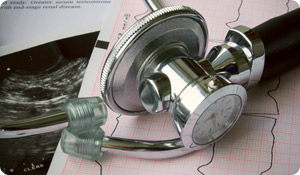
Pacemakers are surgically implanted devices that are used to send small electrical impulses to the heart muscle in order to maintain a normal heart rate (from 60 to 100 beats a minute at rest) and usually prescribed for people with heartbeats below 60 beats per minute at rest or for people with a fast heart rate of over 120 beats per minute at rest. They can also be used to treat fainting spells (syncope), congestive heart failure and hypertrophic cardiomyopathy (a condition in which the heart muscle becomes thick, forcing the heart to work harder to pump blood). Approximately 500,000 people in the U.S. have undergone a pacemaker implant and more than 100,000 pacemaker implants are performed each year.
Weighing about 13 grams (under half an ounce), pacemakers are the size of two stacked silver dollars and contain a pulse generator, which houses a battery and circuitry programmed to monitor heart rate and deliver electrical pulses to the heart, and leads, flexible, insulated wires that deliver the electrical pulses. The device is placed under the skin near the heart under local anesthesia in a hospital by a cardiologist.
Before deciding whether you need a pacemaker, your doctor will perform a series of tests to determine the cause of your irregular heartbeat. These tests may include:
- Electrocardiogram to measure your heart's electrical impulses
- Echocardiogram to determine how well your heart is functioning
- Holter monitor to record your heartbeat for a full 24-hour period
- Stress test to measure heart rhythm after walking on a treadmill or riding a stationary bike
Once the pacemaker is installed, it can be checked via the telephone every few months using a transmitter that's attached to wristbands on each of your arms or a wand placed over the pacemaker, which sends the information to your doctor's office.
Precautions to Take
Although it's unlikely that your pacemaker would stop working properly because of electrical interference, there are a few precautions you should take.
-
Cell Phones. While it's safe to talk on a cell phone, you should avoid placing the cell phone directly over your pacemaker when the phone is turned on to avoid the pacemaker misinterpreting the cell phone signal as a heartbeat and withholding pacing
-
Security Systems. While airport metal detectors won't interfere with your pacemaker, it could set off alarms. If security personnel want to use a hand-held metal detector, ask them not to hold the device near your pacemaker site. To avoid problems, carry an ID card stating that you have a pacemaker
What You Don't Have to Worry About
- Microwave ovens
- Televisions and remote controls
- Radios
- Toasters
- Electric blankets





